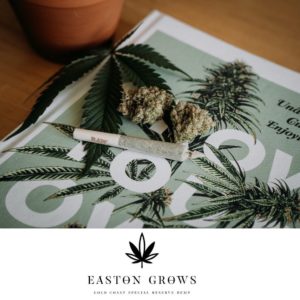1st town in state to allow hemp cultivation on town-owned land? Easton
Asked to guess which Connecticut municipality is the first in the state to allow hemp cultivation on town-owned land, Easton ”” population: 7,605, an increase of 115 over the past 10 years, according to the U.S. Census Bureau ”” probably wouldn”™t finish in the top 10 for most residents.
Yet there it is at 22 S. Park Ave.: A one-acre plot being used by Easton Grows LLC as a pilot educational farming initiative with hemp as its central product. The idea is to help local farmers gain hands-on experience by sustainably farming the crop with an eye toward commercialization.
The project was created by longtime Easton residents Jeff Becker and Dwight Senior, who initially thought of establishing a hops-based facility, but due to the intricate trelliswork involved they soon turned instead to hemp.
 With the help of First Selectman Dave Bindelglass, the pair received a hemp cultivation license. Their search for additional partners eventually led them to Griff Conti, owner-operator of Franny”™s Farmacy, a CBD and hemp oil retailer in Westport.
With the help of First Selectman Dave Bindelglass, the pair received a hemp cultivation license. Their search for additional partners eventually led them to Griff Conti, owner-operator of Franny”™s Farmacy, a CBD and hemp oil retailer in Westport.
“They walked into my store and explained what they were looking for,” Conti said. “They”™re very active in Easton, and are adamant about establishing not only a cultivation center, but somewhere that provides agrotherapy as well.”
The latter is a relatively new concept based on the idea of keeping those with behavioral issues such as PTSD occupied in a rural and agricultural setting, forming relationships, as it were, with plants and animals as well as with fellow people. The group is also hoping to establish a healing garden, patterned after the green spaces found at hospitals and other health care facilities that are meant to encourage peace of mind through meditation and reflection.
“I have no personal experience with growing hemp,” Conti noted. “We grow ours in North Carolina. But their passion was so great and the fact that they seemed to have the backing of the town, made sense.”
“Seemed” turned out to be the key word. “There were a lot of concerns expressed” amongst members of the Board of Selectmen, the Easton Agricultural Commission and the South Park Avenue Advisory Committee (SPAC),” whose members include Becker and Senior, Conti said. “Questions about security, the smell and other things despite the fact that (hemp)”™s a federally legal plant and we had said we would give 20% back to the town.”
Ultimately Easton Grows won approval ”” but with some important caveats. Instead of the original five years, later reduced to two, the partnership won a one-year lease for the pilot program, which promises not to interfere with the New England Prayer Center, the home of its owners, or the Aspetuck Land Trust, which will manage the 19 acres next to the site.
“We finally got approval in late July ”” well beyond our April 1 target date,” Conti said.
Although the hemp production season typically runs from April through October, he said; what saved the Easton Grows project was that a couple of hundred plants were already being cultivated in a greenhouse. The partnership must vacate 22 S. Park Ave. by Nov. 30, Conti said, though hope remains that they could return next spring.
“Look, Easton is a farming community,” he said. “And farmers are struggling. Hemp is a sustainable crop that has all kinds of uses.”
That includes clothing (hemp reportedly has three times the tensile strength and many times the durability of cotton); fuel (hemp can produce 10 times more methanol than corn and burns “clean”); and even food, via hemp seed, whose oil is a source of high-quality protein.
There are also, of course, recreational uses. “We just started selling it last week” at Franny”™s, Conti said. “We have pounds of it.”
He estimated that the 20% “kickback” to the town this year, when all is said and done, “could be in the thousands to the tens of thousands of dollars.”
Even with Easton Grows”™ uncertain future in the town, Conti said that momentum would appear to be on their side. “There have only been 90 hemp-production licenses given out by the state this year,” he said. “But there were only 45 last year.”
Hemp is “not a complex crop to grow,” he continued. “What we”™d like to see is a co-op where different farmers get involved in growing it and sustaining it, and learning along the way.”
While the partnership is seeking other land in Easton for its second year, it is also reaching out to other communities. “We got in touch with Weston ”” but they didn”™t respond,” Conti said. “They”™re a little more conservative. But we think we”™ll start seeing more interest as we go along. The fact that it”™s sustainable and represents good money-making potential for both the farmer and the municipality will count for a lot.”